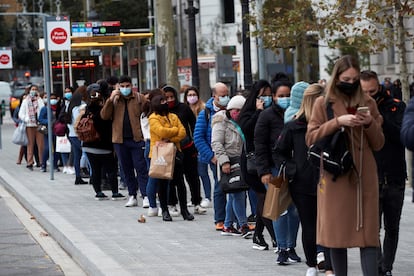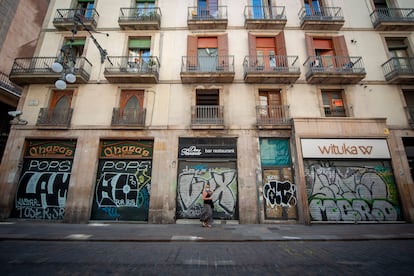Catalonia rejects relaxation of coronavirus measures despite pressure from business, culture sectors
The regional government says that the epidemiological situation has “stabilized,” but it is waiting to see the impact that reopening the hostelry sector will have

Shopping malls will not be reopening, and nor will the capacity of large cultural spaces such as the Liceu in Barcelona be increased. For now, the Catalan regional government, known as the Govern, is resisting the pressure from certain economic sectors to relax the coronavirus measures that are currently in place. The health department has stated that the curve of the epidemic has “stabilized” in the region, but is still at very high levels.
The room for maneuver should the situation worsen is very small, and the region’s government is seeking to avoid acting too soon. Catalonia was due this week to enter into “phase 2” of its deescalation plan, which included increased capacity for the hostelry sector, businesses and cultural venues. But an increase in the speed of transmission of the virus has prompted that plan to be put on hold. Pressure on the region’s hospitals, what’s more, continues to be high: there are 1,590 Covid-19 patients currently receiving treatment, with 395 people in intensive care units.
Medium-sized companies have spent 17 weeks of this year without being able to work and are condemned to definitive closureBusiness associations Foment Comerç and PIMEComerç
“We are waiting to see the progress in the coming days of epidemiological indicators,” stated Marc Ramentol, the general secretary of the Catalan health department, when asked about a relaxation of the social restrictions in the culture and business sectors. The heads of the Liceu opera house said this weekend that the reduced capacity of 500 people at their venue is making their cultural activity unworkable, and they warned that if the situation does not change they will have to suspend their performances of La Traviata.
The business associations Foment Comerç and PIMEComerç have also called on the Govern to let the stores located in shopping malls reopen. They were hoping for an answer by Monday, but there has been no response so far, they explained. The associations represent medium-sized companies and they say that 35,000 people depend on their businesses, “which have spent 17 weeks of this year without being able to work and are condemned to definitive closure.”

The speed of transmission of the virus, the so-called R number, is currently at 0.99 in Catalonia, just shy of the value of 1 considered to be the limit beyond which the authorities must take action to control the virus’s spread. Once this value reaches 1, this means that one person infected with the coronavirus infects another, and the risk of transmission getting out of control is greater. The 14-day cumulative number of coronavirus cases per 100,000 inhabitants, meanwhile, another key indicator, continues to fall and is currently at 218.80. But the Govern is insisting on waiting: the impact of the reopening of hostelry, culture and sport that began two weeks ago on the epidemiological curve will start to become clear in the coming days. This will determine whether the Catalan executive takes a step forward or back with its deescalation plan.
If the transmission rate continues to rise, then the number of daily infections – which is currently still falling slightly – will start to shoot back up again. And this will happen in a complicated context, in the midst of a week with several fiestas, and the Christmas season just around the corner. “This pandemic has shown us that it takes a number of twists and turns,” explained Ramentol from the department of health. “We were working with several scenarios at the start of last week and by the middle of the week, we had to change them. Our stated intention is to balance the restarting of economic and social activity with containing the pandemic.” The Govern fears that there may be a third wave of the coronavirus from January onward.
If the transmission rate in Catalonia continues to rise, the number of daily infections will start to shoot back up again
Ramentol and Jacobo Mendioroz, the coordinator of the Covid-19 monitoring unit in Catalonia, are, however, celebrating the improvements to the track-and-trace system in the region. The health department chiefs said that the close contacts of a positive case receive a call within hours of an infection being detected, and that the observance of quarantines – which was around 60% in early September – now stands at 73%.
“We are working on a rigorous analysis of where and how the infections take place,” said Mendioroz. In fact, 43% of positive cases do not know where they became infected. “In the cases of people who do know, it is because they have been infected at home or they know that there is a positive case in their environment,” he continued. “But there are people who have ventured outside, such as to go to work, and they don’t know. What we are doing is to find that percentage of people who don’t know where they could have been infected, find them, and cut off the chains of transmission.”
English version by Simon Hunter.
Tu suscripción se está usando en otro dispositivo
¿Quieres añadir otro usuario a tu suscripción?
Si continúas leyendo en este dispositivo, no se podrá leer en el otro.
FlechaTu suscripción se está usando en otro dispositivo y solo puedes acceder a EL PAÍS desde un dispositivo a la vez.
Si quieres compartir tu cuenta, cambia tu suscripción a la modalidad Premium, así podrás añadir otro usuario. Cada uno accederá con su propia cuenta de email, lo que os permitirá personalizar vuestra experiencia en EL PAÍS.
¿Tienes una suscripción de empresa? Accede aquí para contratar más cuentas.
En el caso de no saber quién está usando tu cuenta, te recomendamos cambiar tu contraseña aquí.
Si decides continuar compartiendo tu cuenta, este mensaje se mostrará en tu dispositivo y en el de la otra persona que está usando tu cuenta de forma indefinida, afectando a tu experiencia de lectura. Puedes consultar aquí los términos y condiciones de la suscripción digital.








































